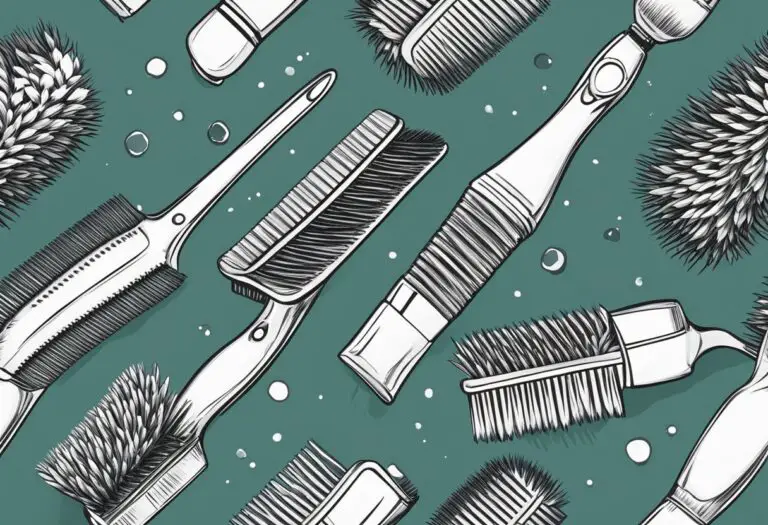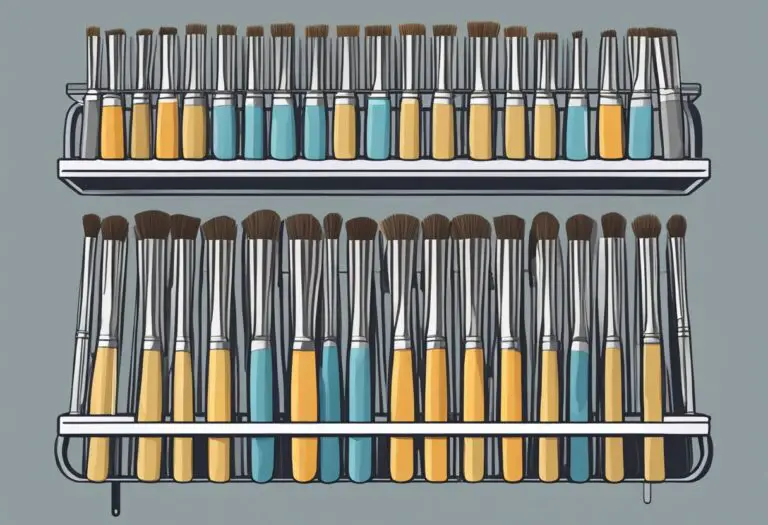What are some eco-friendly alternatives for brush cleaning solvents?
Eco-Friendly Alternatives for Brush Cleaning Solvents: A Guide
Brush cleaning solvents are widely used in the art industry to clean brushes and prevent paint buildup. However, these solvents can be harmful to the environment, as they contain toxic chemicals that can pollute water and soil. As a result, many artists are seeking eco-friendly alternatives to traditional brush cleaning solvents.

One option is to use vegetable oil as a brush cleaner. Vegetable oil is non-toxic and readily available, making it a convenient and affordable alternative. Artists can simply dip their brushes in the oil and wipe them clean with a paper towel or cloth. While this method may not be as effective as traditional solvents, it is a safe and eco-friendly option.
Another eco-friendly alternative is to use soap and water to clean brushes. This method is particularly effective for water-based paints, as they can easily be washed away with soap and water. Artists can use a mild soap, such as dish soap or castile soap, to clean their brushes. This method is not only environmentally friendly but also gentle on brushes, helping to extend their lifespan.
Understanding Brush Cleaning Solvents

Brush cleaning solvents are commonly used to clean brushes after use. They are used to remove paint, ink, and other materials from the brushes. Traditional brush cleaning solvents are often made from harsh chemicals that can have negative effects on the environment and human health. In recent years, there has been a growing interest in eco-friendly alternatives to these solvents.
Environmental Impact of Traditional Solvents
Traditional brush cleaning solvents are made from harsh chemicals that can have a negative impact on the environment. These solvents can release volatile organic compounds (VOCs) into the air, which can contribute to air pollution and can be harmful to human health. When these solvents are disposed of improperly, they can also contaminate soil and water.
Health Considerations
Traditional brush cleaning solvents can also have negative effects on human health. The harsh chemicals in these solvents can irritate the skin, eyes, and respiratory system. Long-term exposure to these chemicals can also lead to more serious health problems, such as cancer.
To avoid these negative effects, it is important to consider eco-friendly alternatives to traditional brush cleaning solvents. These alternatives are often made from natural ingredients and are less harmful to the environment and human health. Some examples of eco-friendly alternatives include vegetable oil, soap and water, and citrus-based solvents.
Overall, it is important to consider the environmental and health impacts of traditional brush cleaning solvents. By choosing eco-friendly alternatives, you can help to reduce your impact on the environment and protect your health.
Water-Based Solvents

Water-based solvents are a great eco-friendly alternative for brush cleaning. They are typically made from natural ingredients and are much less harmful to the environment. Water-based solvents are non-toxic and do not contain any harsh chemicals that can harm your brushes or your health.
Homemade Mixtures
If you are looking for an affordable and eco-friendly alternative for brush cleaning, you can make your own water-based solvents at home. One popular recipe is to mix equal parts of water and vinegar. This mixture is effective at removing dirt and grime from your brushes, and it is also safe to use on most types of brushes. Another popular recipe is to mix a tablespoon of baking soda with a cup of warm water. This mixture is great for removing tough stains and is also gentle on your brushes.
Commercial Water-Based Solutions
If you prefer to use a commercial product, there are many eco-friendly water-based solvents available on the market. These products are typically made from natural ingredients and are free from harsh chemicals. They are also effective at removing dirt and grime from your brushes. Some popular brands include Winsor & Newton Brush Cleaner and Master’s Brush Cleaner & Preserver.
In conclusion, water-based solvents are a great eco-friendly alternative for brush cleaning. They are non-toxic, affordable, and effective at removing dirt and grime from your brushes. Whether you choose to make your own homemade mixture or purchase a commercial product, you can feel good about using a product that is safe for you and the environment.
Natural Oil-Based Cleaners
When it comes to eco-friendly alternatives for brush cleaning solvents, natural oil-based cleaners are a great option. These cleaners are made from plant-based oils and are free from harsh chemicals and toxins. They are not only good for the environment but also gentle on your brushes.
Vegetable Oils
Vegetable oils such as olive oil, coconut oil, and sunflower oil can be used as natural brush cleaners. These oils are effective in breaking down makeup and dirt from your brushes. Simply pour a small amount of oil onto a plate or shallow dish and swirl your brush in it. Rinse the brush with warm water and repeat the process until it is clean.
Essential Oils
Essential oils are another natural option for cleaning brushes. Tea tree oil, lavender oil, and eucalyptus oil are great choices as they have antibacterial properties that can help disinfect your brushes. To use essential oils as a brush cleaner, mix a few drops of your chosen oil with a carrier oil such as olive oil or jojoba oil. Swirl your brush in the mixture and rinse with warm water.
Overall, natural oil-based cleaners are a great eco-friendly alternative for brush cleaning solvents. They are affordable, effective, and gentle on your brushes. By using these natural alternatives, you can keep your brushes clean without harming the environment.
Biodegradable Cleaning Agents

When it comes to brush cleaning solvents, biodegradable cleaning agents are an excellent eco-friendly alternative. These cleaning agents are made from natural ingredients that break down quickly in the environment, making them a safer option for both the user and the planet.
Citrus-Based Cleaners
Citrus-based cleaners are a popular choice for those looking for a biodegradable cleaning agent. These cleaners are made from natural citrus extracts that are non-toxic and biodegradable. They are effective at removing oil-based paints and are gentle enough to use on delicate brushes.
Citrus-based cleaners are also versatile and can be used for other cleaning tasks around the home. They are an excellent alternative to harsh chemical cleaners and are safe for use around children and pets.
Soap Nuts
Soap nuts are another biodegradable cleaning agent that is gaining popularity. These nuts come from the soapberry tree and contain saponin, a natural surfactant that is effective at removing dirt and grime.
Soap nuts are easy to use and can be placed in a muslin bag and added to the washing machine for a natural laundry detergent. They are also effective at cleaning brushes and can be used in combination with water to create a gentle cleaning solution.
Overall, biodegradable cleaning agents are an excellent eco-friendly alternative to traditional brush cleaning solvents. They are made from natural ingredients, are non-toxic, and break down quickly in the environment, making them a safer option for both the user and the planet.
Best Practices for Eco-Friendly Cleaning

When it comes to cleaning brushes, there are several eco-friendly alternatives to traditional brush cleaning solvents. However, it is important to follow some best practices to ensure that the cleaning process is as eco-friendly as possible. Here are some tips on how to clean your brushes in an eco-friendly way:
Proper Disposal of Waste
One of the most important things to consider when cleaning brushes is the proper disposal of waste. If you are using an eco-friendly alternative to traditional brush cleaning solvents, it is still important to dispose of the waste properly. This means that you should not pour the waste down the drain or throw it in the trash. Instead, you should find a hazardous waste disposal facility in your area and dispose of the waste there. This will ensure that the waste is properly handled and does not harm the environment.
Maintenance and Care of Brushes
Another important aspect of eco-friendly brush cleaning is the maintenance and care of brushes. By taking good care of your brushes, you can extend their lifespan and reduce the amount of waste generated by having to replace them. Here are some tips on how to maintain and care for your brushes:
- Rinse brushes well after each use to remove excess paint or other materials.
- Use a mild soap and warm water to clean brushes.
- Avoid using harsh chemicals or solvents on brushes.
- Store brushes in a dry, cool place to prevent mold and mildew growth.
By following these best practices for eco-friendly cleaning, you can ensure that your brushes stay clean and in good condition while also reducing your impact on the environment.







